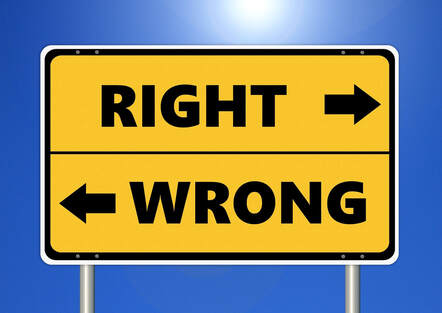Democracy Newsletter: May 2023By Steve Zolno Hopefully you have seen Rob’s post from last month about fair treatment for transgender individuals. For me, that brings up the question of whether laws alone can establish fairness, or we need to look beyond them to have the type of society in which we want to live. Our laws are based on a morality that we assume members of our society have in common.  Image: Succo/Pixabay Image: Succo/Pixabay A difference between us and other creatures is that we recognize a need for consistent behaviors. From the earliest times, people created rules, and then laws, to enable them to live together. This is the basis upon which societies are built. Laws are an attempt to provide guidelines for acceptable behaviors and consequences for violations. But autocratic leaders often are immune to following them. Because there have been laws in all societies as far back as we can see, we must assume that there are people whose actions fall outside their moral codes. Some questions we might ask:
Laws became codified in early societies, such as those of King Hammurabi of Babylon, which are the oldest complete codes yet discovered. Those codes — and similar ones from that time — provided specific punishments for infractions, including the famous phrase “an eye for an eye.” They also stated that their moral principle was “to prevent the strong from oppressing the weak.” In democracies, laws are written by representatives of the people and are assumed to apply equally to everyone. As I’m sure you have noticed, there is no end to our lawmaking process. New laws continually are being created and old ones revised to fit circumstances that previously were not considered. This creates careers for lawmakers. But are we clear about the intent of our laws? Do we want to punish people for violations, to create a better society, or both? Will we ever get to a point where we have enough laws to guide us, or is there another approach that might help us realize our intent more efficiently? Within each of us lies an ideal of how we want to be treated, and thus how people should treat others, if we are to live together successfully. Laws in democracies are an attempt to approach this ideal. But as we all have seen our laws — and each of us — often fall short.  Image: Tumisu/Pixabay Image: Tumisu/Pixabay What if our democracies emphasized working together toward common goals rather than competition? What if our educational system encouraged responsible behavior toward others? What if in our everyday interactions we focused on the value of other human beings? Many of our laws assume the worst about people: that they are capable of operating only from the view of their own limited self-interest. But when I begin to see my self-interest tied to that of others, and operate from that principle, a win-win outcome may be possible. I begin to operate from a view that seeks outcomes that benefit us both. You might be thinking: “Human nature is basically selfish. No one would be willing to take that view.” That would be a reasonable assumption based on our experience. But perhaps, just in our own lives, we could begin to choose to look at others more as partners than as adversaries. Perhaps we could take the first step toward creating the morality we hold in our minds, at least in our own interactions. You may consider it naïve to expect changes in our basic societal perceptions. Slavery, and then segregation, once were assumed to be essential to the functioning of a large segment of society, and now most of us realize that those institutions, and the views on which they were based, no longer serve those on either side of the divide. Our society once held homosexuality to be a mental disease, but observation in place of prejudice eventually upended that view. And though many see transgender individuals with suspicion, or even contempt, our society may be coming to the realization that all sexual orientations and gender identities are valid. Many intolerant viewpoints once backed by laws were overturned as we opened our minds and hearts and their error became apparent. Even during the times in which these mistaken views dominated our culture, there were those who saw beyond them and worked — privately and publicly — to overturn them. Perhaps there are those in our day who see that all views and laws based on blame and recrimination only lead to the perpetuation of the hate we want to eliminate. Of course some laws are needed: Serious anti-social behavior must result in isolation of the perpetrator, but our ultimate goal must be reintegrating the individual into society rather than sticking a label of blame on a person for life. We don’t need to change the world to alter our perceptions and interactions. We can take the view that seeing others as not quite as human as ourselves impedes the ability of our world — and each of us — to move forward. We can consider the possibility that how we see people may be only half-truths, and perhaps the other person also is a human being trying to succeed in a competitive world. Perhaps there is more to others — and of us — than we usually allow ourselves to perceive. The type of morality by which we live affects us personally. If we hold others in esteem we have a personal experience of esteem; if we hold others in contempt we experience contempt. So perhaps when engaged in conflict we can refocus on a direction that suits us mutually rather than only our side. Perhaps as we interact in a way that considers the needs of all we can find a viable path forward. Perhaps as we do this, we will get less of what we think we want but more of the peace of mind we seek. And perhaps we will begin to experience more of the freedom that democracy promises. Steve Zolno graduated from Shimer College with a bachelor’s degree in Social Sciences and holds a master’s in Educational Psychology from Sonoma State University. Steve has founded and directed private schools and a health care agency in the San Francisco Bay Area. He is the author of six books. Please recommend this newsletter to people who you think might appreciate it. If you want to be added to the email list to receive each new newsletter when posted, fill out our contact form and check the box just above the SUBMIT button. You may also use that form to be removed from our list.
Visit our Books page for information about purchasing The Future of Democracy, The Death of Democracy, Truth and Democracy, and Guide to Living In a Democracy. Click ↓ (#) Comments below to view comments/questions or add yours. Click Reply below to respond to an existing comment.
0 Comments
|
 5th edition now available 5th edition now available
Steve ZolnoSteve Zolno is the author of the book The Future of Democracy and several related titles. He graduated from Shimer College with a Bachelor’s Degree in Social Sciences and holds a Master’s in Educational Psychology from Sonoma State University. He is a Management and Educational Consultant in the San Francisco Bay Area and has been conducting seminars on democracy since 2006. Archives
July 2024
Categories |
 RSS Feed
RSS Feed